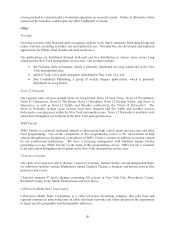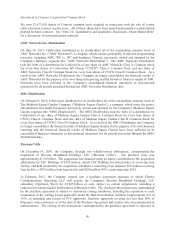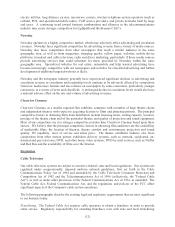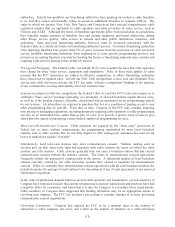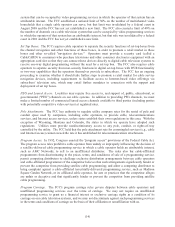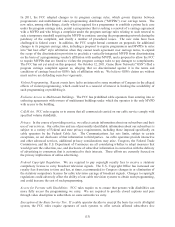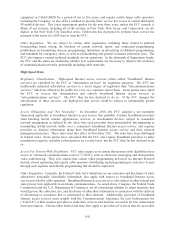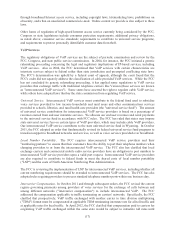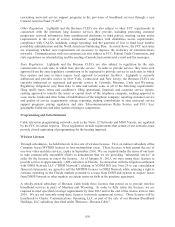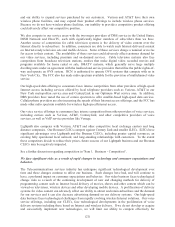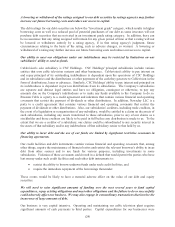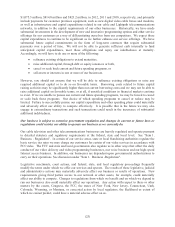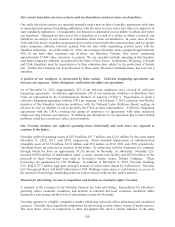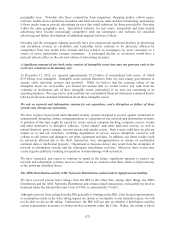Cablevision 2012 Annual Report Download - page 24
Download and view the complete annual report
Please find page 24 of the 2012 Cablevision annual report below. You can navigate through the pages in the report by either clicking on the pages listed below, or by using the keyword search tool below to find specific information within the annual report.(18)
July 1, 2014. After that date, compensation for such traffic would be reduced to interstate rates.
Intercarrier compensation for all terminating traffic, including VoIP traffic exchanged in TDM format,
will be phased down over several years to a "bill-and-keep" regime, with no compensation between
carriers for most traffic exchanged. The FCC's authority to establish these rules is subject to appeals
consolidated in the U.S. Court of Appeals for the 10th Circuit.
Other Regulation. Interconnected VoIP service providers are required to provide enhanced 911
emergency services to their customers; protect customer proprietary network information from
unauthorized disclosure to third parties; report to the FCC on service outages; comply with telemarketing
regulations; comply with disabilities access requirements and service discontinuance obligations; and
comply with call signaling requirements. Interconnected VoIP service providers are also required to
comply with CALEA standards. As noted above, the FCC is examining whether new requirements are
necessary to improve the resiliency of communications networks.
Other Services
We may provide other services and features over our cable television system, such as games and
interactive advertising, that may be subject to a range of federal, state, and local laws such as privacy and
consumer protection regulations. We also maintain various websites that provide information and content
regarding our businesses and offer merchandise for sale. The operation of these websites is also subject
to a similar range of regulations.
Lightpath and the Bresnan CLECs
The Telecommunications Act of 1996 was enacted to remove barriers to entry in the local telephone
market that continues to be dominated by the Bell Operating Companies ("BOCs") and other ILECs by
preempting state and local laws that restrict competition and by requiring ILECs to provide competitors,
such as cable operators and long distance companies, with nondiscriminatory access and interconnection
to the BOC and ILEC networks and access to certain portions of their communications networks (known
as network elements) at cost-based rates. The 1996 Telecommunications Act entitles our Lightpath and
the Bresnan CLEC subsidiaries to certain rights, but as telecommunications carriers, it also subjects them
to regulation by the FCC and the states. Their designation as telecommunications carriers also results in
other regulations that may affect them and the services they offer.
Interconnection and Intercarrier Compensation. The 1996 Telecommunications Act requires
telecommunications carriers to interconnect directly or indirectly with other telecommunications carriers.
Under the FCC's intercarrier compensation rules, Lightpath and the Bresnan CLECs are entitled, in some
cases, to compensation from carriers when they terminate their originating calls on their networks and in
other cases are required to compensate another carrier for utilizing that carrier's network to terminate
traffic. The FCC has adopted limits on the amounts of compensation that may be charged for certain
types of traffic. As noted above, the FCC has revised its intercarrier compensation rules to phase
intercarrier compensation rates for terminating traffic down over several years to eventually establish a
"bill-and-keep" regime, where most traffic is exchanged between carriers without compensation.
Universal Service. Lightpath and the Bresnan CLECs are required to contribute to federal and state
universal service funds. Currently, the FCC assesses them for payments and other subsidies on the basis
of a percentage of interstate revenue they receive from certain customers. The FCC limits the amount
carriers may place on universal service line items on their customer bills. Lightpath is required to
contribute to the New York Targeted Accessibility Fund ("TAF"), which includes state support for
universal service. State universal service funds have not been established in other states in which
Lightpath operates. The Bresnan CLECs are required to contribute to state universal service funds in
Colorado, Utah and Wyoming. No state universal service fund has been established in Montana. As
noted above, the FCC has made fundamental changes to its federal universal service fund programs,


